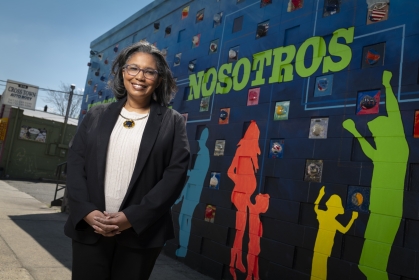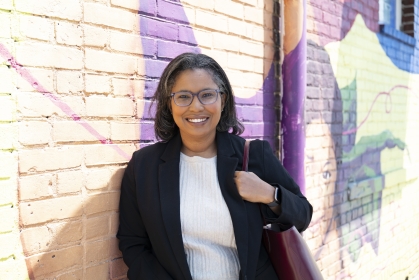

Tackling Health Disparities in COVID: Rutgers Researchers Aim to Expand COVID Testing among Black, Latinx Populations

Although the COVID-19 pandemic disproportionately impacts members of underrepresented communities, these vulnerable communities remain profoundly under-tested. A team of Rutgers researchers, led in part by Rutgers Robert Wood Johnson Medical School faculty, is hoping to change that trend and help identify strategies to lessen health disparities.
“Programs are needed that use relationships with trusted sources of information to build mutual respect, inform and educate, and provide opportunities for individuals, organizations and populations to actively engage with COVID-19 testing education,” says Shawna Hudson, PhD, professor and chief, Research Division, Department of Family Medicine and Community Health, and director, Center Advancing Research and Evaluation for Patient-Centered Care (CARE-PC), Robert Wood Johnson Medical School. Dr. Hudson is principal investigator for the NJ HEROES TOO (New Jersey Healthcare Essential WoRker Outreach and Education Study – Testing Overlooked Occupations) study.
NJ HEROES TOO, an 18-month project supported in part by the New Jersey Alliance for Clinical and Translational Science (NJ ACTS), was funded under the National Institutes of Health’s (NIH) Rapid Acceleration of Diagnostics (RADx) initiative, RADx Underserved Populations (RADx-UP). Rutgers is one of 32 institutions that received an NIH award through the RADx-UP program to support projects designed to rapidly implement COVID-19 testing strategies in populations disproportionately affected by the pandemic.
The timing is critical. Although a concerted effort to address health disparities nationally began in earnest more than two decades ago, early and emerging COVID studies demonstrate there is still a long way to go. In fact, the Centers for Disease Control and Prevention has stated that the pandemic “has highlighted that health equity is still not a reality.”
A 2021 report by the APM Research Lab, a member of the American Public Media Group family, showed Black and Hispanic/Latino Americans were 2.7 times more like to have died of COVID than white Americans in 2020. In New Jersey, the highest COVID mortality rates were found among Black and Latinx residents—346 per 100,000 and 352 per 100,000, respectively.
The results echo findings of Rutgers studies in the early phases of the pandemic, which showed higher rates of positivity in Black, Latinx, and lower-income workers. Compared to non-Hispanic white participants, the odds of a positive test were twofold higher among Black and Latinx populations, according to the RWJ Screening Study, which looked at hospital and medical staff in New Brunswick. In addition, the study showed infection rates were especially high among lower-income medical roles (e.g., technicians and phlebotomists), as well as hospital support roles (dining/food service, maintenance/housekeeping, and security/support)—positions that are more likely to be held by poor women and disproportionately by people of color.
As a result, NJ HEROES TOO focuses specifically on Black and Latinx individuals who are working in lower-income healthcare professions. These populations are extremely important, because they are microcosms of their communities, says Dr. Hudson.
Developing an Effective Strategy
The researchers hypothesized that Black and Latinx healthcare workers reaching out to their family and friends about COVID testing could be as effective as traditional community outreach efforts, and knew that Rutgers already had a pool of potential “ambassadors” at its disposal through the RWJ Screening Study and Rutgers Corona Cohort.
The concept for the program is straightforward: Talk to Black and Latinx healthcare workers and their communities to find out their thoughts and concerns about COVID testing and vaccines, develop informational materials to address those concerns and encourage testing, and implement an at-home testing program using the Rutgers-developed saliva test. Then, researchers would compare this method against traditional community education techniques to evaluate the cost and effectiveness of an ambassador strategy.

The scope of the project is massive—covering four of the most densely populated counties in the most densely populated state in the country—with the involvement of more than two dozen Rutgers researchers, and 22 community-based organizations and health care employers. The counties selected (Essex, Middlesex, Passaic, and Union) all have shown a high burden of COVID among their Black and Latinx populations. As many as 2,000 individuals will ultimately be tested as part of the NJ HEROES TOO initiative, half through the ambassador strategy and the remaining thousand through standard community education efforts.
In the initial phase of the project, researchers interviewed approximately 110 individuals across the four counties being studied, soliciting opinions on COVID testing and their experiences with COVID, as well as their thoughts about the vaccine and vaccine acceptance. That feedback was used to craft the toolkit used for the testing intervention, which started in May 2021, Dr. Hudson says.
The interviews yielded interesting, and in some cases surprising, feedback from participants that served not only to shape the materials but also prompted the team to adjust some of the assumptions it initially made during the planning of the project, Dr. Hudson notes. For example, the team initially believed that their healthcare worker ambassadors would have access to COVID testing through their workplaces, but learned that was not necessarily the case. As a result, NJ HEROES TOO expanded COVID testing availability to include the healthcare workers in addition to their family and friends, Dr. Hudson says. Concerns about individuals’ reluctance to participate in mail-in and supervised testing also proved to be unfounded, as respondents in the focus groups said the ease of mail-in testing was particularly helpful for those with transportation or child care issues, and supervised testing would help them feel more comfortable in “collecting the sample in the way that it needs to be collected,” she adds. With regard to vaccine hesitancy, much of what was learned helped in targeting messages to the correct sensitivity points for people. While historical issues—such as the Tuskeegee study on untreated syphilis and the use of Henrietta Lacks’ cells in research without her knowledge—were still important, much of what the researchers heard were informed questions that individuals felt were not being answered—or that they did not have people they felt comfortable speaking with to address their issues, Dr. Hudson explains.
The biggest challenge regarding the messaging related to COVID testing was making a compelling argument for why it is still important, she says.
“We’ve had really strong messages about the importance of getting the vaccine, but not the same kind of emphasis on testing as another part of the toolkit. We’ve gotten messaging on hand washing, on social distancing, on wearing face masks, but not the same emphasis on testing. I think that’s that one of the major challenges for us in this project, particularly in the context of limited vaccine uptake in some of our communities and limited access to vaccine for children,” she says.
That message is needed for healthcare workers in addition to other community members, Dr. Hudson notes.
“One of the reasons that testing works is that you know how has it and who they are exposing. Healthcare workers were saying, ‘Well, we’re the only ones exposed; our family members aren’t.’ It really underscored the need to get the message out about the importance of testing, particularly at a time when people are looking at vaccines as a complete return to normalcy, but there are unvaccinated people who still remain unprotected,” she says. “You can still get COVID. It’s really important to know what your status is, because while there are some people who are vaccinated, there are still many others who aren’t. Before, people were a little bit more circumspect in their behavior. Now with face-mask mandates easing it is important, particularly for those unvaccinated, to test—in some ways even more than we did before—and people are not seeing or understanding why that is important.”
In addition to developing project-related materials, the team also developed “enduring materials” to help provide a seamless transition from the testing phase of the NJ HEROES TOO project, with information on other sites for testing in the county, networking information, support resources, and so on, she says.
Contributing to the National Discussion
As a Rutgers alumna who earned her undergraduate, master’s, and doctoral degrees at the university, Dr. Hudson finds it particularly gratifying to play a role with her alma mater and fellow Rutgers alumni in a project with the potential for such far-reaching impacts on the community.
“Half of the project directors—Manny Jimenez, Diane Hill, and I—are Rutgers alumni and have been part of these communities for some time,” she says. “We’re not swooping in from an ivory tower, divorced from what’s happening here. We live here. These are the issues I’m talking about with the women I get my hair done with. These are the things we’re seeing and experiencing, from the ground up.
“I would really love for this study to be known. It is one of the biggest forays of Rutgers community responses to address health disparities in our local communities,” Dr. Hudson adds. “There have been lots of efforts, but nothing that’s ever been on this scale, where we’ve been able to work with so many community and healthcare organizations to bring all of these forces to bear on a critical issue.”
Dr. Hudson hopes NJ HEROES TOO will be fundamental in addressing the current needs around COVID.
“We still have disparities in terms of treatment, access, who is getting care, and outcomes,” she says. “We would love for this study to add to the national discussion about effective strategies to actually engage our communities and address those issues at a national level—to be an ‘incubation site’ for great ways to work with the community on these issues, and show how we, as New Jerseyans, can actually add to the larger discussion nationally.”
Part of that discussion should involve primary care, she asserts, noting that the lack of engagement with primary care regarding COVID has been a major issue.
“People in our study talked about the importance of their primary care doctors as the place they trust for their healthcare. But in terms of COVID response, the major initiatives around testing and vaccine were concentrated in pop-up megasites and pharmacies for roll-out, but not primary care,” she says. “When you think of our populations and where they’re going for their care and who they’re actually talking to, I think that primary care being left out of that conversation was a major misstep nationally. It will be interesting to see in the coming months, when these sites shift their focus, how the continued disparities will be addressed.”
Leveraging Relationships
Because the project involves not only four different counties, but also a lifespan approach, the team needed to think broadly in terms of the coalitions with whom they were working, Dr. Hudson says. That meant collaborating with organizations ranging in size, scope, and focus, she says. For example, the project is working with faith-based organizations, senior centers, maternal and child health corsortia, and organizations that work with issues of social determinants of health, as well as those focused on Black and Latinx communities, such as the Urban League, New Brunswick Area Branch of the NAACP, Puerto Rican Action Board, and ASPIRA, she says. This expansive approach was needed, she explains, because individuals seek information from different types of sources depending on their life stage.
In addition to Dr. Hudson, the project directors include three Robert Wood Johnson Medical School faculty members: Manny Jimenez, MD ‘06, MS, FAAP, assistant professor of pediatrics and family medicine and community health, and director of developmental and behavioral pediatrics education at the medical school’s Boggs Center on Developmental Disabilities; Martin J. Blaser, MD, professor of medicine and biochemistry and molecular biology, Robert Wood Johnson Medical School, and director, Rutgers Center for Advanced Biotechnology and Medicine (CABM); and Reynold A. Panettieri Jr., MD, professor of medicine, Robert Wood Johnson Medical School, and vice chancellor, Clinical and Translational Research, Rutgers Biomedical and Health Sciences. Director of the Rutgers Institute for Translational Medicine and Science, Dr. Panettieri also serves as chair of the NJ ACTS Executive Committee.
NJ HEROES TOO project directors also include Diane Hill, PhD, assistant chancellor for University-Community Partnerships at Rutgers University–Newark; and Emily S. Barrett, PhD, associate professor of biostatistics and epidemiology, Rutgers School of Public Health/Rutgers Environmental and Occupational Health Sciences Institute (EOHSI).
Ultimately, the research team plans to take lessons learned about implementation and opportunities for sustaining these initiatives and developing a process that can be adapted by other sites, as well as easily expanded beyond the healthcare realm to other front-line and essential workers, Dr. Hudson says.
